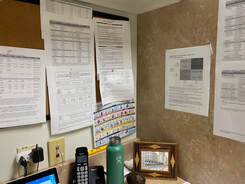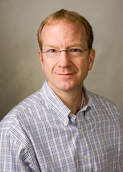A Team Effort: Strong Provider-Detailer Relationships to Amplify Evidence-Based Care (Part II)11/3/2020
Overview: The DETAILS blog presents a special two-part series of what it takes to build a strong provider-detailer relationship from the perspective of a long-time academic detailer and then, from one of her local physician partners that’s received AD for almost 15 years. You can read Part One here. In Part Two, we get a chance to speak with Dr. Robert ‘Bob’ Schwartz, a Vermont family physician and medical director who discusses the impact of AD on his clinical practice. Bob reflects on what a strong provider-detailer relationship looks like from the perspective of a clinician, especially in the midst of COVID-19, and offers his advice to other providers considering AD. An interview with Winnie Ho, NaRCAD Program Coordinator. Tags: Detailing Visit, Evidence-Based Medicine  Winnie: We’re so excited to have the chance to speak with a clinician who’s been receiving AD for a long time! Can you tell us a little bit about how you came to work with the Vermont Academic Detailing Program? Bob: It’s been several years that I’ve been blessed with Amanda Kennedy’s presence on the AD service. I would say that it actually all started back when we first decided we were not going to allow pharmaceutical representatives in the office about 20 years ago. We decided that it wasn’t a good use of our time. Then Amanda and the Vermont Academic Detailing Service came onto the scene. They presented a formal alternative to learn about medications from a non-biased view – and so we’ve participated in every single session since then. W: That’s incredible!  B: The program is great – I think what’s really critical is that the program has such a high level of professionalism that you can be completely trusting of the information that you’re getting. My colleagues and I are always so thrilled when there’s another topic ready. I know how long it takes to get these things set up. You know it’s not just something someone slaps together on a random afternoon. Amanda is an absolutely amazing professional, and the fact that she’s been with us for so long helps develop a personal relationship and it builds trust. W: This relationship has been developed over more than a decade! Here at DETAILS, we don’t always get a chance to ask about what happens after the detailer leaves the office. What challenges in clinical care make it critical to lean on Amanda as a trusted source of evidence and resources? B: I like that AD is not about a specific medication, but rather a specific medical condition. As a clinician, I think about the patient sitting in front of me with COPD, not about who I can get on a specific drug. Pharmaceutical detailers only talked about specific medications and you couldn’t trust the information as unbiased. They never gave you the whole picture. What’s really important in medicine is how all the pieces fit together, and that’s really hard as a clinician to figure out on your own. With AD, I can reach out to say that I have COPD patients and I really want to get more knowledge about COPD.  Dr. Schwartz's desk with AD Materials accumulated through the years from the Vermont Academic Detailing Program Dr. Schwartz's desk with AD Materials accumulated through the years from the Vermont Academic Detailing Program W: Right, and there’s an abundance of research that’s difficult to sort through on your own. B: AD is one of the few places that you can get this comprehensive evaluation of a specific condition and the medications that surround that. The other thing is that they bring materials. It might be a one-page sheet with diabetes medications based on class, relative cost, brand and generic names, and dosage. Or, it might be a COPD assessment score tool that I can easily refer to. These clinical aids are a big part of what detailers bring for us. W: Absolutely – those materials take a long time to create! I wanted to dive a little deeper into the provider-detailer relationship. What role do you think trust plays in sustaining a provider-detailing relationship for the long-term?  B: When we ask Amanda a question that she doesn’t know the answer to, she will tell us that she doesn’t know, but will look into it. A week later, you get an e-mail with information that she’s put together. We trust her and know that the dynamic of the relationship is not manipulative. We know that the information is carefully researched and that she’s not going to fill in the blanks by winging it. All of our detailing sessions have an unstructured portion where we can ask specific questions of Amanda. It allows the providers in our practice to have an organic conversation about a specific issue, and it can be hard to replicate this without the support of a detailing program. W: It’s always important to acknowledge what we know and what we don’t know, especially right now with COVID-19. It’s disrupted a lot of things, and I imagine for our healthcare providers, more than ever, there’s a lot of extra challenges. Our detailers’ main goals have always been to support their local providers and to be there with them through obstacles as they arise. What would you want detailers to understand about the challenges that COVID has brought on for clinicians?  B: Everything has been changing over the last several months and navigating COVID challenges takes up a lot of time. However, we still have to take care of our diabetes and our COPD patients and so more than ever, it’s critical that we have access to information that is streamlined, accurate, and that we can be confident in. I always tell people that medicine and life are team sports, and if you think you’re going to excel at either one of those alone, you’re going to be disappointed every time. We need Amanda on our team because she fills this vital role, that’s even more vital to have filled today. W: And finally, we know that there’s a lot of other clinicians who may be on the fence about receiving AD because they’re unfamiliar with it, or may have lingering distrust from pharmaceutical representatives. As someone who’s received AD for a long time, what advice would you give to other providers who may be considering these visits?  B: I conceptualize AD like this – it’s like getting on the super highway instead of taking the secondary roads. I could drive to Chicago and never leave a two-lane highway, or I can get on the 90 and drive on that to Chicago all the way. To other clinicians – we have certain responsibilities to ourselves and our patients, and one of those responsibilities is to keep up with what’s going on and to know how to use it to better care for our patients. What I would tell other clinicians is that, you have this responsibility anyway – why not have another team member who’s an expert on this and give this information to you in an hour what would have taken you six hours to do yourself? We’ve loved our partnership with Amanda, and we look forward to what comes next out of it. Have thoughts on our DETAILS Blog posts? You can head on over to our Discussion Forum to continue the conversation!  Bob Schwartz, MD, is a family physician at Northshire Medical Center in Manchester, Vermont. He’s served as the Associate Medical Director for Dartmouth Hitchcock Putnam, a multi-specialty group in the southwestern part of Vermont. Dr. Schwartz completed his family medicine training at Lancaster General Hospital in Lancaster, PA following his medical education in the Honors program at Northwestern University. He currently lives in East Dorset, Vermont. Comments are closed.
|
Highlighting Best PracticesWe highlight what's working in clinical education through interviews, features, event recaps, and guest blogs, offering clinical educators the chance to share successes and lessons learned from around the country & beyond. Search Archives
|
